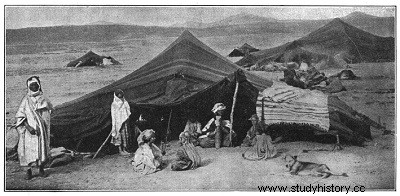
There is also the revival of Arabism after the liberation of Turkey's yoke of countries with an Arab majority, or Arab culture. All deplore the decline of Islam and wish to restore it to life and greatness through Arabism. There is talk of the complete independence of Egypt, Hejaz, Saudi Arabia, Transjordan, Iraq. For what reason, then, should the Indies, Syria, Lebanon, even Tunisia and Morocco, all countries of old civilization, not also gain independence one day? And every citizen of these last countries to think that he is worth an Egyptian, a Jordanian or an Iraqi.
Gandhi campaigned in India for passive resistance, therefore for non-violence, more effective in the long run than action by force.
In Indochina, a fervent communist, Nguyen Ai Quoc, who would later become Ho Chi Minh, claimed the independence of the Three Kys:Tonkin, Annam, Cochinchina. His party, still few in number (30,000 members), sparked a revolt in 1930 in Yen Bay (north-west Tonkin) and Vinh (Centre Annam), which was harshly suppressed.
In Madagascar, a teacher, Ralaimongo, then his successor, Ravoahangy, made incessant demands without managing to create a troubled situation.
In Syria, the revolt of the Druzes was put down, but the nationalists Arabs from Damascus and Aleppo maintain a perpetual agitation in these cities.
In Tunisia, Sheikh Tahalbi, leader of the Destour, publishes an anti-French book, Tunisie martyre, and then takes the road to l 'exile. The torch of nationalism was then taken up by Habib Bourguiba, creator of a younger party with broader popular bases, the Neo-Destour, which sparked several riots, notably in 1937-1938.
In Algeria, the traditionalist ulemas (doctors of theology) of Sheikh Ben Badis in Constantine advocate a return to the sources of Arabism and the Koran. Ben Badis' profession of faith has the value of a program:"Islam is my religion. Arabic is my language. Algeria is my homeland. ' For his part, Ferhat Abbas, a pharmacist in Sétif and a politician, campaigned on the contrary in favor of assimilation to France, while Messali Hadj, who initially had strong ties with communism, worked the proletarian masses with his " North African star.”
In Morocco, finally, the Berber dahir of May 15, 1930 crystallized, as soon as it was published, the nationalist opposition in the cities. The "Moroccan Action" was created in 1934. It succeeded in arousing fairly serious unrest until 1937. Mohammed ben Hassan el-Ouazzani, of French training, and Allal el-Fassi, of pure Islamic tradition, were the leaders of line of this movement followed by the advanced urban youth. We are not yet claiming independence, but we are calling for a return to the strict notion of the protectorate. We are in fact criticized for doing more and more direct administration, which is contrary to the spirit as well as to the letter of the treaty signed in Fez, in 1912, between France and Morocco.
The Arab press in Egypt and Syria multiplies anti-English and anti-French campaigns. Two Arab leaders orchestrate this ensemble, the Emir Chekib Arslan, a Lebanese Druze living in Geneva, and Hadj Amin el-Hosseini, Grand Mufti of Jerusalem. Both maintained excellent relations with the Nazi Goebbels, who saw in this an excellent means of undermining the English and French positions in the Mediterranean; both will serve Hitler during the Second World War.
To these general causes, common to all the colonizing countries, are added, for France, particular considerations. We are not more violently attacked than the others and we even benefit, perhaps, from a certain sympathy, at the very least from the favorable prejudice. On the whole, the agitation is in any case less lively, less deep in our possessions than in Egypt, for example, or in India, where the evil has strong roots. We still have many more friends than enemies among our constituents and we feel like one. A generous and bold policy would enable us to retain most of our positions without too much difficulty and for a fairly long period. But the defects of our political system, the fragility of the executive power that results from it, prevent us from making a choice and sticking to it firmly. We then live by expedients that give our approach a hesitant, if not incoherent, look.
